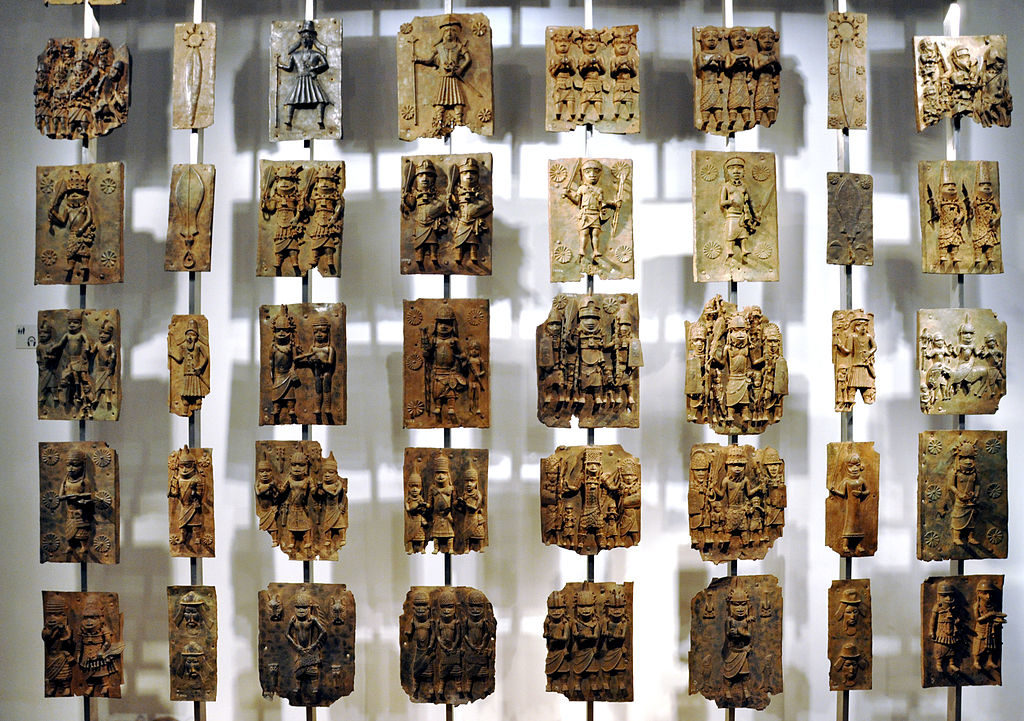Benin stolen artifacts have still not been returned to their rightful owners a century after they were taken from the African continent. This issue resurfaced on the occasion of the plan to build a royal museum to house Africa’s national treasures.
The delay in repatriation due to the Nigerian government’s ineffective policy of quiet diplomacy highlights the need to embark on a massive campaign of public education about the importance and value of national treasures.
It is a known fact that 80 percent of African archaeological treasures reside in different European countries after the continent was plundered and partitioned in the 18th century.
The Benin bronze is one of the notable artifacts which was stolen in 1897, by British troops after the invasion of the then Benin Kingdom and exiled it king, Oba Ovonramwen. These artifacts are currently still on display in the United Kingdom, Germany, Austria and the United States over a century later, and demand to get them back has yielded no positive result.
No apology for Benin Massacre by the UK
Nigeria has been demanding the return these Benin bronzes artifacts for decades, as it represents an unapologetic stance of the United Kingdom for the massacre it enacted in the Benin region in 1897, popularly referred to as “the Benin massacre of ’97”.
Various groups such as the National Commission for Museums and Monuments have also led campaigns calling for the unconditional return of Benin stolen artifacts and other cultural artifacts and works taken illegally from Nigeria and other parts of Africa.
Most recently the country has reiterated its demand for the repatriation of these artifacts as its plans to open the Royal Museum to house these treasures. In response to the demand the British Museum which reportedly holds a larger percentage of the artifacts carted away with said it is only opened to loaning some of the artifacts to Nigeria with the aim of getting it back after a while.
The British response has sparked uproar among many concerned Nigerians both within and in the diaspora. Many of the concerned individuals urge the Federal Government to put more pressure and create a proper structure for the repatriation of the artifacts.
The statement also increased pressure on European governments as more African countries demand that their historic treasures be returned, and public outcry urging Western countries to simply give back what they stole escalates.
Dr. Orobator Daniel, a lecturer of History and International studies said the Nigerian government is not doing enough to get back the artifacts. He said,
The international bodies are not doing to anything to assist with the repatriation, because the Federal Government is also not showing the necessary attitude towards the current situation.
There were observations that the artifacts generate revenue for the United Kingdom and their release can affect the UK’s economy, which is not a valid justification for the retention of the treasures.
Benin stolen artifacts exemplify poor policy
Umoahlor Jeffery, an expert on International diplomacy, blamed the difficulty in getting the artifacts back on the poor policy adopted by the Federal Government.
According to him “the policy of quiet diplomacy employed by the Nigerian government did not create any awareness, and until Nigeria change this and raise the issue of restoration of Benin artifacts to their ancestral home on the global scene they would not achieve their aim.
Jeffery stated:
Once Nigeria abandons the ineffective policy of quiet diplomacy, and choose to embark on a massive campaign of public education about the importance and value of its national treasures it stands a better chance of getting them back.
He further clamored that the United Nations Educational, Scientific and Cultural Organisation (UNESCO) Intergovernmental Committee on Restitution of Cultural Property, must be asked to assist in getting the artifacts back.
Dr. Daniel further noted that some important questions must be asked of the Federal Government including its response towards the British museum stating it was going to loan back the Benin stolen artifacts. He stressed that:
The wrong impression Nigerian put out about themselves is the way we are treated by the foreign government. And our leaders do not care about the prosperity of the country. This is one of those things that could boost our cultural heritage and they left overseas for decades, ignoring the relevant facts that these artifacts can also serve a purpose in developing and generating income for the country.
He also advised Nigeria to publish a preliminary list of the Benin stolen artifacts it seeks to recover from European states and museums, which would make the process of repatriation easier. This would show the Federal Government more seriousness towards getting the artifacts back.
Dr. Orobator conclusively advised the Federal Government to intensify its demands and find a better medium of asking for the artifacts back.
Repatriation gets little assistance from the Federal Government
An anonymous source from the Benin palace also stated that effort being made to recover these artifacts has been slow because the royal palace is getting little assistance from the Federal Government. The source said:
There is no assistance from the Federal Government and activist group that have arouse to demand the return are not taking seriously by European countries.
It is also of worthy mention that in 2017 France President, Emmanuel Macron thrilled students at the University of Ouagadougou in Burkina Faso, when he promised the repatriation of the Benin stolen artifacts.
The French president in his speech was able to smash the conventional justification for refusing to return artworks. Because many believe they belong to the state or, in the case of the British Museum, are held by its trustees on behalf of Parliament.
Although Macron’s promise is still in limbo 3 years today, the French president’s attitude should be emulated by the rest of the world leaders, especially now that Africa is being considered as the next tech hub for Europe.
In 2019, France committed to returning 26 of the Benin stolen artifacts by 2021:
At a meeting in Cotonou with Beninese president, Patrice Talon, the French Minister of Culture, Franck Riester, reaffirmed a promise to return artifacts from Benin that are currently held at the Musée du Quai Branly–Jacques Chirac in Paris.







